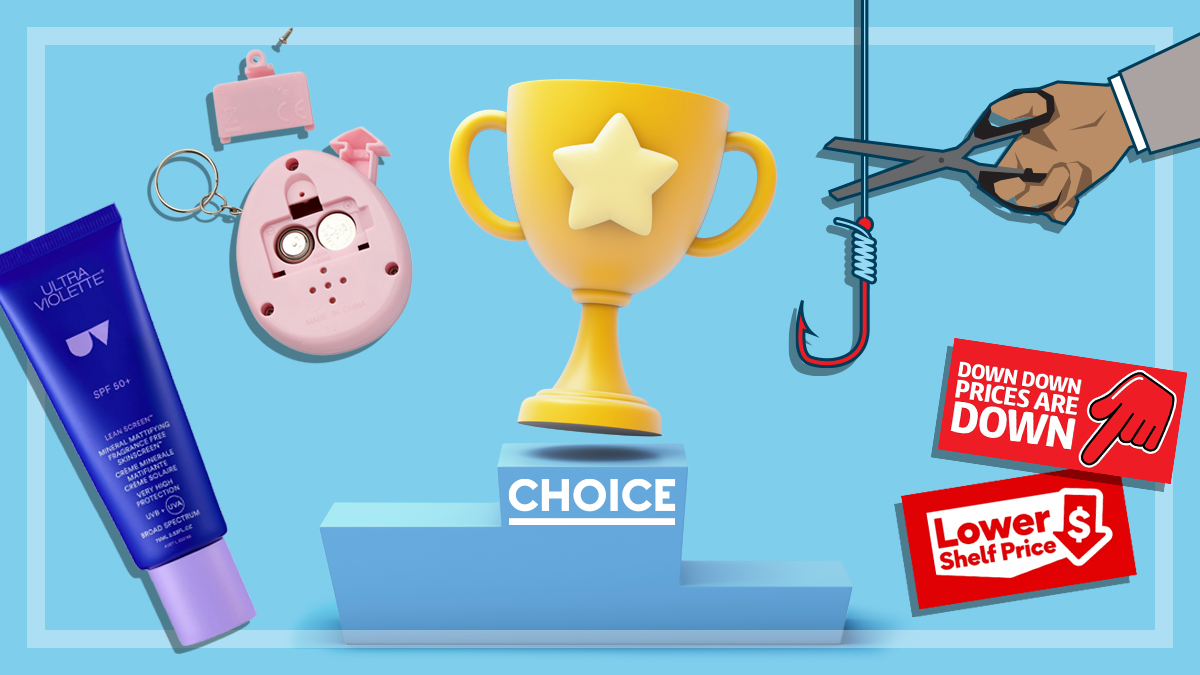Get our independent lab tests, expert reviews and honest advice.
Telemarketers and door-to-door sales

We’ve all had the experience: you’re at home and the phone rings. It’s a salesperson with a strong desire to sell you something right now and with an almost bulletproof ability to withstand polite refusals.
On this page:
- Unsolicited consumer agreements explained
- The rules of an unsolicited consumer agreement
- Your rights if you buy something
- Cancelling the agreement in the cooling-off period
- How to avoid unsolicited approaches
Or there’s a knock on the door and you open it to find the world’s pushiest salesperson with the world’s best product to sell you.
Or how about those people who want to have an over-friendly chat and sell you something in the middle of a shopping centre or (more creepily) in dingy shopping centre car parks?
The Do Not Call Register and the Do Not Knock stickers have worked well to weed out many nuisance calls and stop a lot of door-knocking, but there are still some people who manage to find their way to your phone number or your front door.
We’ve heard stories of some very persistent tree loppers. And the Do Not Call and Do Not Knock safeguards won’t help you in the shopping centre situation. So what can you do?
Unsolicited consumer agreements explained
Door-to-door sales, telemarketing sales and other direct sales that don’t take place in a retail setting are called unsolicited consumer agreements.
Under the Australian Consumer Law, consumer protections apply to unsolicited consumer agreements, which happen when:
- they are the result of negotiations which take place over the phone or at a location which is not the seller’s place of business (such as your front door or the shopping centre car park);
- a seller or their sales agent approaches you or phones you uninvited; and
- the total value is more than $100 (or the value can’t be determined when the offer is made).
Most of the time these unsolicited consumer agreements arise from telemarketing, door-to-door selling, or when you’re approached by a salesperson in a shopping centre.
But there are other occasions where they might arise. For example, you fill in a competition entry and the seller contacts you to sell you another product or service. Or you return a missed call from an unknown phone number and a salesperson then sells you something.
Exclusions
There are some exceptions to the laws about unsolicited consumer agreements. For example:
- Donations to charity, where there is no sale involved.
- Business contracts for goods or services which are not usually for personal, domestic or household use.
- Renewal of an existing sales agreement such as a telephone service.
- Party plan sales (such as for well-known plastic storage containers or books or kitchen appliances) where the host makes it clear that you are invited to the party and might be sold something and at least three people are invited.
A sale which is made at a stall or a kiosk set up in a shopping centre won’t be an unsolicited consumer agreement if the stall is the place where the seller has their business and the salesperson remains within the stall and doesn’t follow you around the shopping centre.
The rules of an unsolicited consumer agreement
If someone wants to sell you something that falls under the definition of an unsolicited consumer agreement, there are certain rules they must follow.
1. Sales agents can only knock or phone at certain times and days
Unless you’ve agreed beforehand, sales agents are not allowed to knock on your door:
- on a Sunday or a public holiday
- before 9.00am or after 6.00pm on a weekday
- before 9.00am or after 5.00pm on a Saturday.
Telemarketers are not allowed to call you:
- on a Sunday or public holiday
- before 9.00am or after 8.00pm on a weekday
- before 9.00am or after 5.00pm on a Saturday.
2. Sales agents must show ID
Door-to-door sales agents should show you some identification and tell you why they’re there and what they want to sell. The ID should include their name and the organisation they represent and contact details of the organisation.
Similarly, telemarketers should start their call by telling you their name, the organisation they represent and its contact details and the purpose of the telephone call.
3. Sales agents must leave if you ask them to
Sales agents must tell you that you can ask them to leave. If you do ask an agent to leave, they must leave immediately.
If you ask a sales agent to leave, they’re not allowed to contact you on behalf of the same seller for at least 30 days. But some sales agents act on behalf of a few different companies, so they might contact you again on behalf of a different company.
It’s a bit easier on the phone, because you can always hang up on the telemarketer if you don’t want to speak with them. But if they keep calling you despite you asking them to stop, you can contact the business and ask them not to phone you any more. You can also register your phone number on the Do Not Call Register.
The ACCC has prepared three informative videos which help you to understand how these laws work in practice when someone comes knocking on your front door.
Your rights if you buy something
If you do want to go ahead and buy something worth more than $100 from a door-to-door sales agent or telemarketer or one of those people who wander around shopping centres, there are requirements they must follow.
Before you sign or agree to anything, the salesperson must tell you that you have the right to terminate the agreement if you change your mind.
You must be given a copy of the agreement immediately (if it’s a door-to-door or shopping centre sale) or within five days if it’s a telephone sale. The agreement must:
- be clearly printed or typed (apart from handwritten amendments)
- be in clear and understandable language
- set out all the terms in full
- set out the total cost to you including GST, or it must clearly set out how the cost will be calculated
- state the delivery charges
- include the sales agent’s name and contact details
- set out the supplier’s name, ABN or ACN, address, email address and fax number
- be signed by you and by the agent
- come with a notice that you can use to cancel the agreement
- include a notice on its first page which very clearly informs you of your rights to cancel the agreement.

Cancelling the agreement in the cooling-off period
The first page of any unsolicited consumer agreement must include a very clear notice which tells consumers that they have a right to cancel the agreement within 10 business days.
This is called a cooling-off period. The sales agent must also tell you about your right to a cooling-off period before you sign the agreement.
If you decide during the cooling-off period that the agreement is not what you want, you can cancel the agreement with no penalty.
The cooling-off period starts on the first business day after you sign, or on the first business day after you receive the agreement if it was negotiated over the phone.
Extensions to the cooling-off period
The cooling-off period can be extended to three months if the sales agent did any of the following:
- Contacted you outside the permitted hours for door-to-door sales, without your prior permission.
- Did not tell you their identity or why they were visiting you.
- Did not leave when you asked them to leave.
The cooling-off period can be extended to six months if the sales agent did any of the following:
- Did not tell you about the cooling-off period.
- Did not give you a copy of the agreement.
- Gave you an agreement which did not have all the required information contained in it.
- Did not sign and/or have you sign a copy of the agreement.
- Started supplying goods worth $500 or more within the 10-day cooling-off period (but they can supply goods worth less than $500).
- Started supplying services within the 10-day cooling-off period (not including new gas or electricity supply).
- Accepted or demanded payment for goods or services during the 10-day cooling off period (not including for new gas or electricity supply).
How to cancel in the cooling-off period
You can cancel the agreement during the cooling-off period verbally or in writing. If you cancel verbally it’s a good idea to make a note of the conversation, including the date and time, who you spoke with, and briefly what was said.
If you want to cancel in writing you can post, email, fax or hand deliver a written notice to the supplier.
If you post it, the supplier is deemed to have been handed it on the date you posted it. Keep a copy of the postage receipt so you can prove the date it was posted.
The cancellation notice does not have to be in any specific form. But it’s a good idea to include the following information:
- Supplier’s name and contact details.
- Information about the goods or services and the cost.
- Date of agreement.
- Your name and contact details.
- A statement that you wish to cancel the agreement.
- Your signature and the date.
You should return any goods to the supplier or arrange for them to be collected. If the supplier does not collect the goods within 30 days, they become your property.
You should take reasonable care of the goods as the supplier could possibly seek compensation if you damage them. However, you won’t have to pay compensation for normal wear and tear or any damage which was outside your control
How to avoid unsolicited approaches
Doorknockers
If you don’t want sales agents to knock on your door, consider printing out and displaying a Do Not Knock sticker.
These signs are useful in deterring sales agents as they make it clear that you are not interested in door-to-door sales. But unfortunately there’ll always be someone who thinks that the sign doesn’t apply to them or that their product or service is so fantastic you really need to know about it.
If that’s the case, tell them you’re going to report them to the ACCC and your fair trading or consumer protection agency. You can also report them to the police for trespassing, although the effectiveness of this will depend on the extent of the trespass and on your local police station’s resources.
If you’re suspicious about someone who is doorknocking, check your state or territory’s fair trading or consumer protection agency to see if there are any dodgy doorknockers operating in your neighbourhood.
From time to time there are unlicensed tradespeople who target certain communities trying to sell roof cleaning or house cleaning or bitumen for driveways or other types of home maintenance. They often move on to another suburb or town fairly quickly after they have been detected.
Telemarketers
If you don’t want to receive calls from telemarketers, you can put your phone number on the Do Not Call Register (DNCR).
This is a database managed by the Australian Communications and Media Authority that lists the land line, mobile, fax and VoIP numbers of people who don’t want to receive unsolicited telemarketing calls.
Unsolicited telemarketing calls by Australian and overseas callers to these numbers are prohibited. Registration is free and lasts for eight years.
Not all calls will be stopped when you register, but you should receive a lot less. You may still receive calls from public interest organisations such as charities, political parties and educational institutions as these are not prevented from calling numbers on the DNCR.
Market researchers are also allowed to conduct polling and questionnaire type research, but if their calls include a commercial purpose, then they might be considered to be telemarketing.
If you’ve registered your number on the DNCR but you’re still receiving telemarketing calls, you can lodge a complaint with the DNCR.
Marketers at shopping centres and car parks
Unfortunately, there’s not much you can do to stop the car park or shopping centre wanderers approaching you except try to look the other way or tell them (always politely of course) that you’re not interested in their products.
But if they’re particularly bothersome, complain to centre management. The more complaints they receive the more likely it is the centre will get rid of them.





